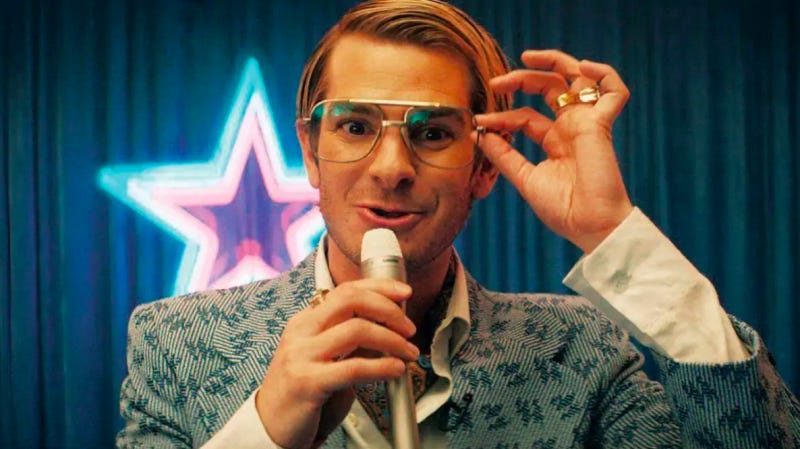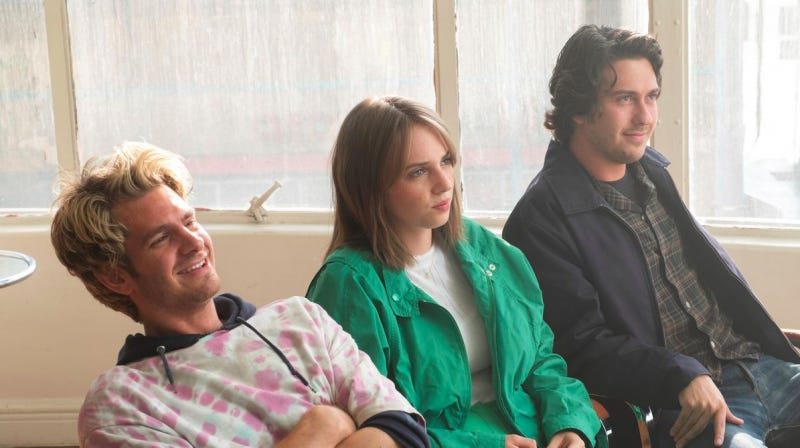Mainstream
Gia Coppola (of the filmmaker family) experiences a sophomore slump with her second feature, "Mainstream," an out-of-touch satire of Internet fame that is as shallow as it is unbearable.
Writer/director Gia Coppola comes from a famous family. Her aunt is Sophia Coppola of “Lost in Translation” fame. Her grandfather, Frances Ford Coppola, is one of the greatest filmmakers the world has ever seen (and he makes a good bottle of wine too).
The now-34-year-old writer/daughter exploded onto the filmmaking scene when she was 27 years old and directed “Palo Alto,” a film starring James Franco based on writings by the actor. It wasn’t a perfect film by any means but for a young filmmaker’s’ debut, it showed real promise and it currently has a 70 percent score on Rotten Tomatoes, which isn’t too shabby.
For her sophomore effort, Coppola has created “Mainstream,” a purposely strange film that will possibly resonate with a select few. But for this reviewer here, it was unbearable. It’s an exhausting film full of fortune cookie wisdom and a muddled message that feels about 10 years too late to the party.
The movie is the cinematic equivalent of some overly confident and overly inebriated stranger trapping you in the corner at a party and spouting some half-baked soliloquy about how we are, “All slaves to our phones, man.”
“Mainstream” is a satirical take down of Internet fame headlined by former Oscar-nominee and one-time Spider-Man Andrew Garfield. I’m not sure how I feel about Garfield as an actor. I enjoyed him in “The Social Network,” “Hacksaw Ridge” and “Silence” but he was an awful Peter Parker. Something about him just bugs me. In “Mainstream,” I think he’s supposed to be playing an incredibly annoying and unlikable character, so in that sense he’s succeeded (and the casting was spot on).
To get a sense of Garfield’s character, think YouTube star Jake Paul (who has a cameo has himself) if he was imbued with the soul of Jake Gyllenhaal’s character in “Nightcrawler.”
Maya Hawke, the daughter of Ethan Hawke and Uma Thurman that wowed audiences in season three of the Netflix series “Stranger Things,” plays a lost, broke, twenty-something bartender who hates her job and wishes for something more in life. She stumbles upon Garfield, a goofy jester who pokes fun at mainstream society and everyone’s addiction to their phones, and befriends the enigmatic pontificator. When a video she records of him going on a nonsensical rant in a mall goes viral, she hatches a plan to turn him into an Internet sensation to solve her financial woes.
His “free yourself of your phones” schtick grows bigger and bigger and he eventually gets an agent played by Jason Schwartzman, who is Coppola’s father’s cousin in real life.
As the YouTube show grows, Garfield’s character seems to lose his way (or did he really have it to begin with?) and he becomes more obsessed with being famous rather than having something to say. Nat Wolff plays a co-writer of the YouTube show who warns about ethical concerns and how the channel has become what it once satirized.
The plot is predictable and the characters are so thinly developed that you can see right through them. The soundtrack is filled with ill-fitting music that was likely selected because it sounds young and cool but feels jarring and forced.
The acting? I can’t tell if the actors are just awful or if the screenplay and the director are to blame. Certainly Garfield, Hawke and Wolff do nothing to elevate their roles beyond the dreck written on the pages.
Garfield decides to go insanely big with the role and seems to have a blast chewing the scenery. I suppose an over-the-top performance feels appropriate but that doesn’t mean I can’t hate what he did. Perhaps in an alternate universe, Andrew Garfield’s performance could have ended up something like James Franco’s in “Spring Breakers.” Big and bold and slightly brilliant. Instead, it’s merely big.
The best thing I can say about “Mainstream” is that visually it looks just fine. Coppola has a command of the camera.
I suppose my biggest complaint about “Mainstream” is that it’s so smug and sanctimonious with a “been done before” message about social media and Internet fame.
The TV show “Black Mirror” has tackled all of these topics much more intelligently. And if you want to watch a truly great movie about a media-inspired frenzy following a false messiah then watch the 1970s classic “Network.”
Literally every character in “Mainstream” is so full of shit. And it boggles the mind that Hawke’s character would every be drawn to Garfield’s techno-prophet. Even before his character “changes,” he was unbearable.
I can’t really say I disagree with the message of this movie but it’s never really clear what the movie is trying to say. It throws more things at the wall than an elephant with a paintbrush.
If you ask Coppola what the movie is ultimately trying to say, I’m sure she would spout some pretentious nonsense like, “Well, it’s really open to interpretation from the viewer” which always feels like a cop out answer for disjointed movies that try to say too much.
The central message about people being addicted to their phones? Obvious, overdone, oversimplified and about 15 years too late.
And while I agree with the premise that people evaluate too much of their self worth based on social media, the movie itself feels so out of touch you’d think that a boomer wrote it instead of a 34-year-old. There’s no real insights and the film lacks awareness. It’s like a caveman grunting, “Phone! Bad!”
There’s real irony in the making of this movie. Garfield plays a shallow narcissist who thinks everything he says is genius and the movie itself feels like it was penned by a kindred soul.
The sad thing is I know one day I will run into someone who thinks this movie is brilliant and I’ll just smile and nod because I won’t have the energy to tell them why I hated this movie.
Was this whole movie a joke on the viewers? I think that is giving the filmmaker too much credit.
In the end, I think the main reason I hated this movie is because it feels like a half baked idea that was lazily executed. I can forgive movies that try something ambitious and brave but don’t quite stick the landing perfectly, like last year’s “Promising Young Women.” I can look past the flaws of a movie if it has something interesting to say.
But to be unenjoyable and with an uninteresting message? That’s a mortal sin.
Even at 90 minutes this film is exhausting and feels overly long. That’s not a good thing.
I cannot recommend spending money to rent this movie and when it eventually is available for free on a streaming service, keep your expectations extremely low.





